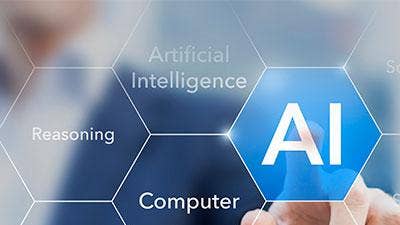The 10 Coolest Machine-Learning And AI Startups Of 2018 (So Far)
Artificial intelligence and machine-learning startups are delivering infrastructure, development frameworks and intelligent applications that let enterprises take advantage of their data in innovative ways.

The Intelligent Future Has Arrived
See the latest entry: THE 10 HOTTEST AI STARTUPS OF 2022 (SO FAR)
An artificial intelligence revolution has been eagerly awaited since the late 1950s, when pioneering IBM researcher Arthur Samuel trained the world's first self-learning computer to play a mean game of checkers.
But only in the past few years has the long-promised technology become mature, effective and -- thanks to a variety of new offerings -- readily accessible to the channel.
AI and machine learning are now taking the industry by storm, with the cloud fast-tracking adoption of solutions that make decisions, automate business processes, deliver predictions and insights and learn from their own experience.
Next-gen startups are at the forefront of the revolution, delivering infrastructure, development frameworks, and intelligent applications that allow enterprises to take advantage of their data in ways never before possible.
(For more on the biggest news of 2018, check out "CRN's Tech Midyear In Review.")
Anaconda
CEO: Scott Collison
This Austin, Texas-based AI startup, formerly known as Continuum Analytics, offers a development environment that empowers data scientists to rapidly deploy machine-learning algorithms into production environments integrated with enterprise IT systems.
Anaconda implements an interactive-notebook concept that connects to other technologies and libraries. The platform provides a central access point for Python developers looking to work together continuously on machine-learning projects.
The platform is geared toward professional data scientists and has cultivated a large active community around its offerings.
Anaconda Enterprise, the company's flagship commercial product, governs and automates AI pipelines from laptop to large-scale production environments.
Clari
CEO: Andy Byrne
Clari's founders have a track record of solving complex problems with machine learning, having cut their teeth in that space with a previous venture that served the legal market.
The Sunnyvale, Calif.-based startup infuses AI into the sales process, with a layer that sits on top of Salesforce and Microsoft Dynamics to deliver predictive and prescriptive insight to sales reps.
Clari analyzes sales data going back two years, then incorporates more data from Office 365, Gmail Exchange, file-sharing services and calendars. The platform compares deals, looks at sales histories, reveals risks, and recommends actions to help reps be more productive and close deals faster.
The company plans to progress beyond sales enablement with its technology.
CognitiveScale
CEO: Akshay Sabhikhi
CognitiveScale, based in Austin, Texas, helps customers interpret big data and implement machine learning across their organizations, from the front office to mission-critical core functions.
The Intel-backed startup's analytic solutions are geared for specific industries. A cognitive computing layer infuses analytics with machine-learning capabilities to better process the so-called dark data that usually goes uncollected and unanalyzed.
The platform ingests structured and unstructured data to deliver insight to consumers and executives, and can scale over IBM, Amazon and Microsoft cloud infrastructures.

DataRobot
CEO: Jeremy Achin
DataRobot uses artificial intelligence to help data scientists build and deploy predictive analytics models faster than previously possible. That alleviates challenges enterprises are facing from a scarcity of data professionals.
The Boston-based startup's machine-learning engine captures the knowledge, experience and best practices of data scientists. The platform trains and evaluates models by searching through millions of possible combinations of algorithms, pre-processing steps, features, transformations and tuning parameters to deliver those best suited for customer data sets and prediction targets.
Those predictive models can be deployed in the cloud or on-premises.

Element AI
CEO: Jean-François Gagné
Element AI works with organizations to build customized applications infused with artificial intelligence.
The company, based in Montreal, translates cutting-edge AI research into business products, enabling enterprises to quickly deploy intelligent apps without recruiting internal AI teams.
Element AI, which has Intel as an investor, looks to democratize artificial intelligence through a collaborative process that aligns around the customer's vision and organizational requirements.

Gong.io
CEO: Amit Bendov
The San Mateo, Calif.-based AI startup began selling its SaaS-based Conversation Intelligence Platform in 2016, aiming to dramatically change the way sales agents work.
The technology automatically records sales calls and videoconferences, transcribes them, and then uses artificial intelligence to analyze hundreds of data parameters within each call.
As part of its push into intelligent systems, Cisco Systems invested in the startup's latest funding round.

H2O.ai
CEO: SriSatish Ambati
The Mountain View, Calif.-based startup offers a popular platform for building smart applications with hybrid cloud support and integration of other open-source technologies.
H2O.ai abstracts away many of the details of deep-learning frameworks like TensorFlow, MXNet and Caffe and allows data scientists and developers to import algorithms into their applications. Large enterprises are using the technology to predict fraud, customer churn, and other vital business indicators.
H20.ai offers Driverless AI, a solution that automates machine learning and introduces visualization and interpretability features for data modeling.

Paperspace
CEO: Dillon Erb
Paperspace aims to fast-track AI development by making GPU-powered cloud infrastructure easily accessible.
The startup out of Brooklyn, N.Y., has focused on facilitating the use of GPUs for machine-learning and deep learning projects that require their computational power.
Paperspace, founded three years ago on the premise that GPUs would soon be a vital resource in the cloud, built a software layer to automate provisioning and managing that infrastructure.
Early use cases were visual effects, data-intensive computing, CAD and virtual desktops. As artificial intelligence broke into the mainstream in recent years, however, more customers turned to the startup for training intelligent algorithms.

SalesDirector.ai
CEO: Babar Batla
Microsoft and Google sales executives partnered with a serial entrepreneur in 2017 to build an AI-based companion for enterprise sales teams. The goal of SalesDirector.ai is to eliminate the mundane administrative work in the back office that burdens typical enterprise sales teams.
The self-service platform eliminates much data entry and automates the deal pipeline and forecasting.
The solution can identify deals at risk, coach reps to follow best practices, and generate risk-adjusted forecasts so customers better understand where their business is coming from. It also has a sentiment engine for evaluating responses from prospects or clients.
SalesDirector.ai works with Salesforce, Microsoft Dynamics and NetSuite channels.

Seldon
CEO: Alex Housley
Seldon delivers open-source and commercial solutions that enable data scientists and developers to rapidly deploy infrastructure for hosting intelligent workloads.
The U.K.-based startup's platform includes proven algorithms, industry models and a microservices API for delivering real-time recommendations and enterprise-grade predictive analytics. The products are platform-agnostic to avoid lock-in.
Seldon recently released Seldon Core, an open-ource framework for deploying machine-learning models on Kubernetes orchestrated clusters.